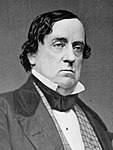
A | B | C | D | E | F | G | H | CH | I | J | K | L | M | N | O | P | Q | R | S | T | U | V | W | X | Y | Z | 0 | 1 | 2 | 3 | 4 | 5 | 6 | 7 | 8 | 9
| |||||||||||||||||||||||||||||||||||||||||
290 members of the Electoral College 146 electoral votes needed to win | |||||||||||||||||||||||||||||||||||||||||
|---|---|---|---|---|---|---|---|---|---|---|---|---|---|---|---|---|---|---|---|---|---|---|---|---|---|---|---|---|---|---|---|---|---|---|---|---|---|---|---|---|---|
| Turnout | 72.8%[1] | ||||||||||||||||||||||||||||||||||||||||
| |||||||||||||||||||||||||||||||||||||||||
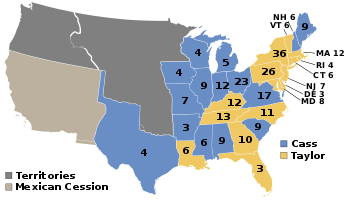 Presidential election results map. Yellow denotes states won by Taylor/Fillmore and Blue by Cass/Butler. Numbers indicate the number of electoral votes cast by each state. | |||||||||||||||||||||||||||||||||||||||||
| |||||||||||||||||||||||||||||||||||||||||
The 1848 United States presidential election was the 16th quadrennial presidential election, held on Tuesday, November 7, 1848. In the aftermath of the Mexican–American War, General Zachary Taylor of the Whig Party defeated Senator Lewis Cass of the Democratic Party.[2]
Despite Taylor's unclear political affiliations and beliefs, and the Whig opposition to the Mexican–American War, the 1848 Whig National Convention nominated the popular general over party stalwarts such as Henry Clay and Daniel Webster. For vice president, the Whigs nominated Millard Fillmore, a New York Whig known for his moderate views on slavery. Incumbent President James K. Polk, a Democrat, honored his promise not to seek re-election, leaving his party's nomination open. The 1848 Democratic National Convention nominated Senator Lewis Cass of Michigan after former President Martin Van Buren withdrew his bid for a second term over a platform dispute. Van Buren broke from his party to lead the ticket of the Free Soil Party, which opposed the extension of slavery into the territories.
The Whig choice of Zachary Taylor was made almost out of desperation; he was not clearly committed to Whig principles, but he was popular for leading the war effort. The Democrats had a record of prosperity and had acquired the Mexican cession and parts of Oregon country. It appeared almost certain that they would win unless the Whigs picked Taylor. Taylor won a plurality of the popular vote and a majority of the electoral vote, while Van Buren won 10.1% of the popular vote, a strong showing for a third party candidate.
Taylor's victory made him the second of two Whigs to win a presidential election, following William Henry Harrison's victory in the 1840 presidential election. Like Harrison, Taylor died during his term, and he was succeeded by Fillmore.
Nominations
Whig Party nomination
| 1848 Whig Party ticket | |||||||||||||||||||||||||||||
| Zachary Taylor | Millard Fillmore | ||||||||||||||||||||||||||||
|---|---|---|---|---|---|---|---|---|---|---|---|---|---|---|---|---|---|---|---|---|---|---|---|---|---|---|---|---|---|
| for President | for Vice President | ||||||||||||||||||||||||||||
 |
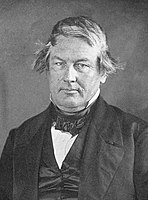 | ||||||||||||||||||||||||||||
| Major general of the U.S. Army (1846–1849) |
14th New York State Comptroller (1848–1849) | ||||||||||||||||||||||||||||

The Whig Party held its national convention in Philadelphia, Pennsylvania, with delegates from every state except for Texas although the Texas Whigs had selected to make the Louisiana delegates their proxies. Henry Clay, Winfield Scott, Zachary Taylor, and Daniel Webster sought the presidential nomination and Taylor led on every ballot before winning on the fourth ballot. After Webster turned down the vice presidential candidacy, Millard Fillmore received the party's vice-presidential nomination on the second ballot after defeating Abbott Lawrence, a Massachusetts politician whose mild opposition to slavery led him to be dubbed a "Cotton Whig". An attempt was made to make both nominations unanimous, but it was unsuccessful due to Taylor's support for the Whig Party being seen as dubious.[3][4]
Democratic Party nomination
| 1848 Democratic Party ticket | |||||||||||||||||||||||||||||
| Lewis Cass | William O. Butler | ||||||||||||||||||||||||||||
|---|---|---|---|---|---|---|---|---|---|---|---|---|---|---|---|---|---|---|---|---|---|---|---|---|---|---|---|---|---|
| for President | for Vice President | ||||||||||||||||||||||||||||
 |
 | ||||||||||||||||||||||||||||
| U.S. Senator from Michigan (1845–1848) |
U.S. Representative for Kentucky's 13th (1839–1843) | ||||||||||||||||||||||||||||


The Democratic Party held its national convention in Baltimore, Maryland. There was a credentials dispute over the New York delegation between the Barnburners and Hunkers factions with the Barnburners being anti-slavery. The delegates voted 126 to 125 to seat both delegations and share their control of New York's votes, but the Barnburners left the convention in disagreement with the compromise while the Hunkers refused to vote. The withdrawal of the Barnburners effectively removed former President Martin Van Buren, who had already become unenthusiastic about trying to win the party's nomination after the convention had voted to endorse a platform supporting popular sovereignty, from contention.[4]
As a result of Van Buren's withdrawal, U.S. Senator Lewis Cass and Secretary of State James Buchanan were seen as the only serious contenders for the presidential nomination, with a draft effort also focusing on Supreme Court associate justice Levi Woodbury. In stark contrast to the highly contested and protracted convention at the previous election, Cass held a wide lead on all four ballots, only being denied victory on the third due to the convention rules requiring a two-thirds majority, before the Buchanan and Woodbury campaigns quietly released enough delegates to allow Cass victory on the fourth ballot. William Orlando Butler won the vice-presidential nomination on the second ballot against John A. Quitman.[5][4]
Free Soil Party nomination
| 1848 Free Soil Party ticket | |||||||||||||||||||||||||||||
| Martin Van Buren | Charles F. Adams | ||||||||||||||||||||||||||||
|---|---|---|---|---|---|---|---|---|---|---|---|---|---|---|---|---|---|---|---|---|---|---|---|---|---|---|---|---|---|
| for President | for Vice President | ||||||||||||||||||||||||||||
 |
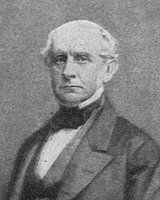 | ||||||||||||||||||||||||||||
| 8th President of the United States (1837–1841) |
Massachusetts State Senator (1844–1845) | ||||||||||||||||||||||||||||
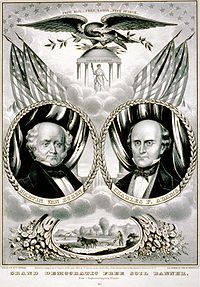
Members of the Whig Party who opposed slavery, New York Barnburners, and members of the Liberty Party met in August 1848 in Buffalo, New York, to found a new political party. The Barnburners made a call for the formation of an anti-slavery party at their conclave in June, and by the People's Convention of Friends of Free Territory, which was organized by Salmon P. Chase, in Columbus, Ohio. The convention was attended by 165 delegates from eight states to form the Free Soil Party.[4]
Van Buren won the party's presidential nomination against John P. Hale on the first ballot with 244 votes against Hale's 181 votes. Hale had been nominated by the Liberty Party in October 1847, but withdrew from the election after the Free Soil Party gave its presidential nomination to Van Buren. Charles F. Adams won the party's vice-presidential nomination.[4]
Van Buren knew that the Free Soilers had not the slightest chance of winning, rather that his candidacy would split the Democratic vote and throw the election to the Whigs. Bitter and aging, Van Buren did not care despite the fact that his life had been built upon the rock of party solidarity and party regularity. He loathed Lewis Cass and the principle of popular sovereignty with equal intensity.[6]
Liberty Party nomination
Despite their significant showing in the prior presidential election, certain events would conspire to remove the Liberty Party from political significance.
Initially, the party's presidential nomination was to be decided in the fall of 1847 at a Convention in Buffalo, New York. There, Senator John P. Hale was nominated for president over Gerrit Smith, brother-in-law to the party's previous presidential nominee James G. Birney. Leicester King, a former judge and state senator in Ohio, was nominated for vice president. Anti-slavery Democrats and Whigs, disappointed with their respective nominees, would form a new movement in conjunction with members of the Liberty Party such as John Hale and Salmon Chase to form the Free Soil Party that summer. At this point, both Hale and King withdrew in favor of a Free Soil ticket led by former President Martin Van Buren, and the great majority of members of the Liberty Party followed them into the new political party.
National Liberty Party nomination
A small faction refused to support Van Buren for the presidency, however. They held another convention in June 1848 as the "National Liberty Party." Gerrit Smith was nominated for president with Charles C. Foote, a Presbyterian minister from Michigan, as his vice presidential running mate.[7]


